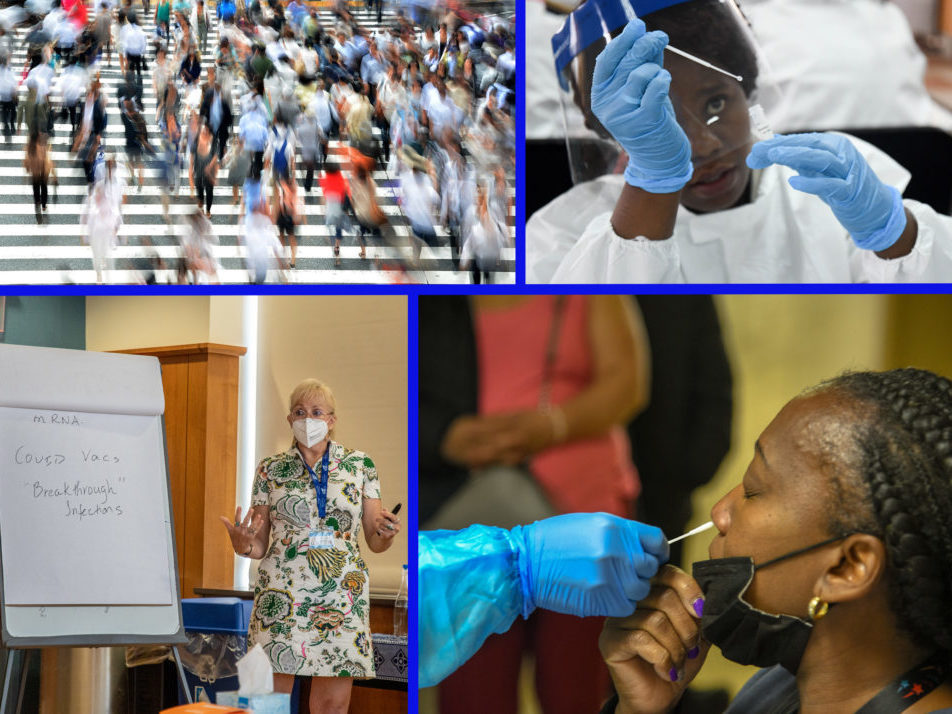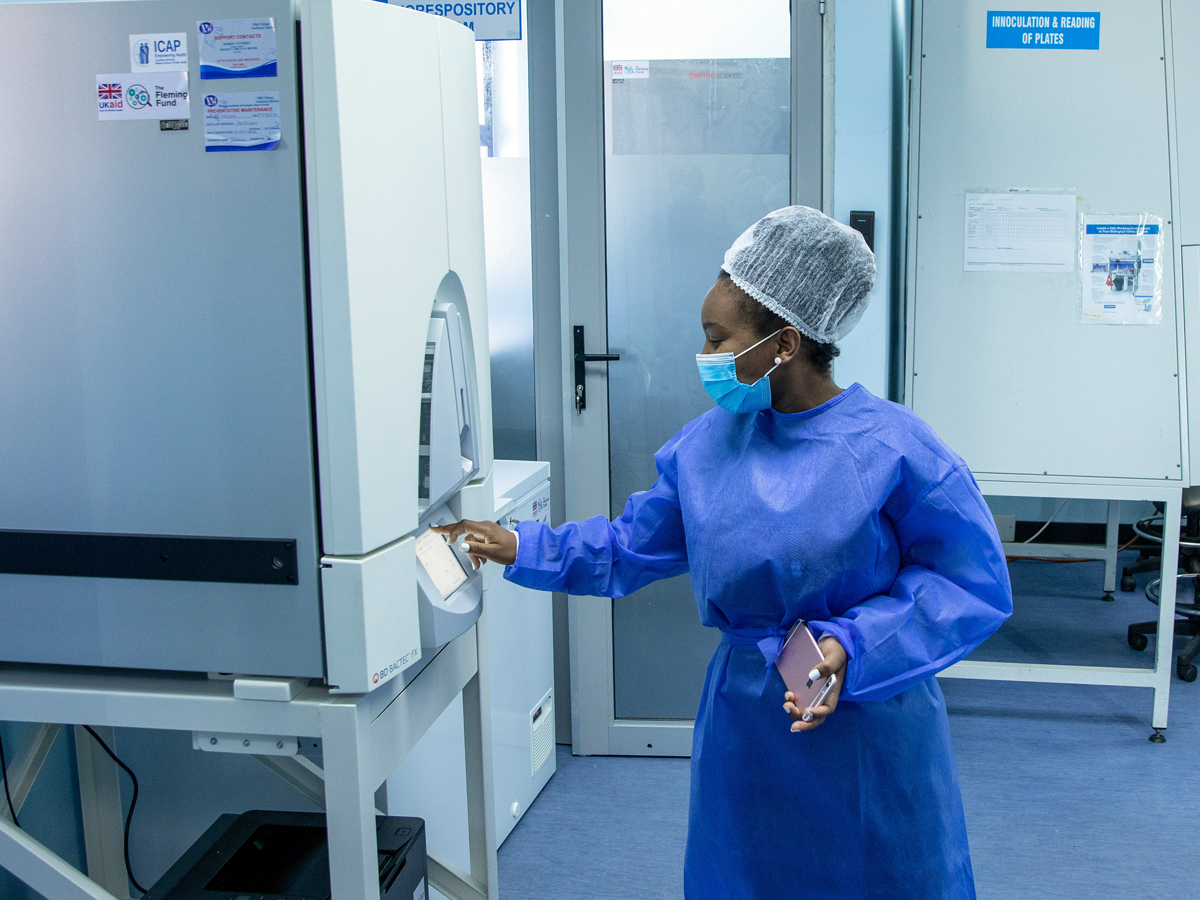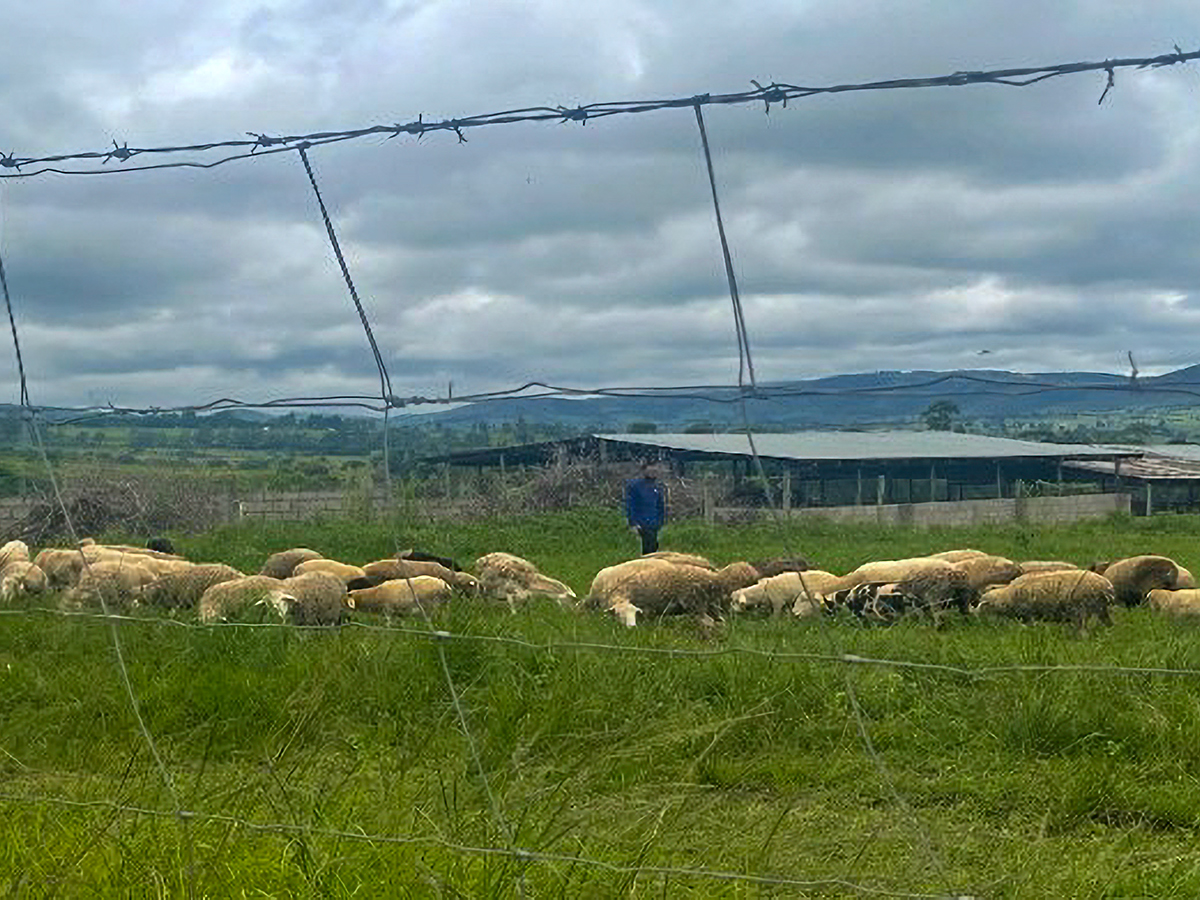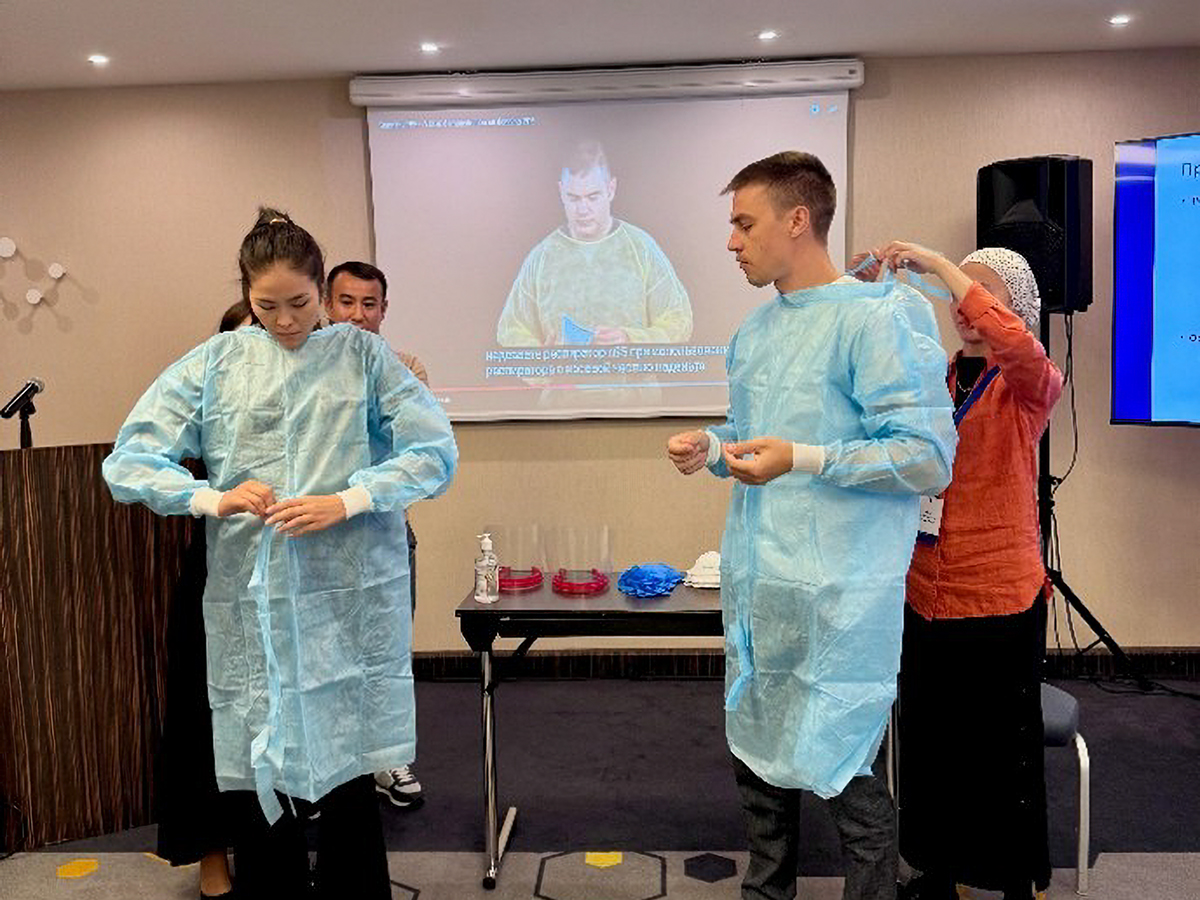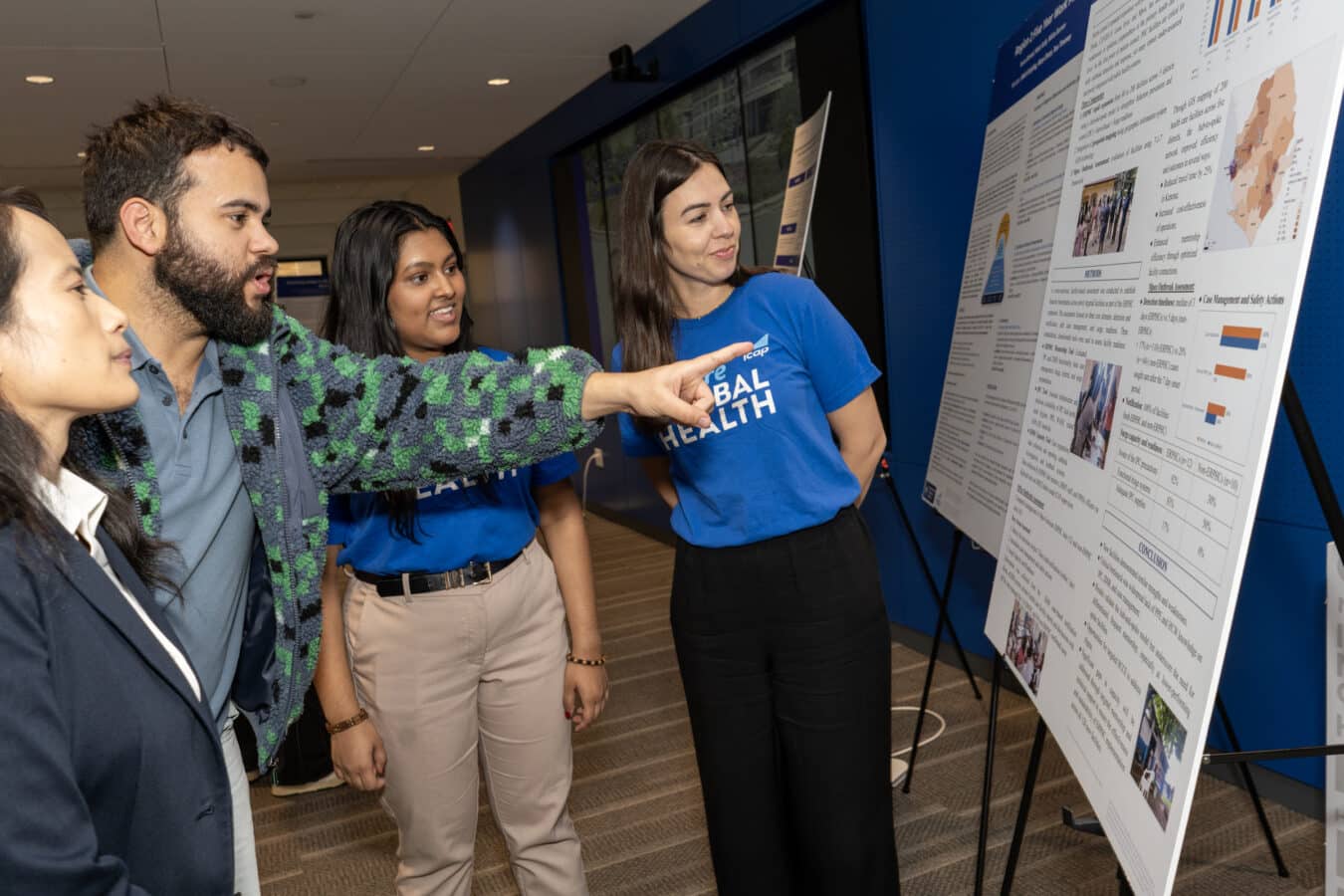Through a groundbreaking new award from New York City Economic Development Corporation (NYCEDC), Columbia University – through its Mailman School of Public Health – and a consortium of academic, community, government, and corporate partners will launch and operate New York City’s first Pandemic Response Institute (PRI). This award builds on Columbia’s robust involvement in the NYC COVID-19 response and grants it a significant role in preparing New York City for future public health emergencies.
Joining Columbia’s Mailman School of Public Health in this landmark endeavor as a key partner is the City University of New York (CUNY) Graduate School of Public Health and Health Policy (CUNY SPH). Other collaborators include the United Way of New York City, the Emergency Medicine All Threats (EMAT) Leadership Forum, EcoHealth Alliance, AMTrace, and dozens of other non-profit, community, faith-based, and corporate entities that fortified the City’s response to COVID-19 and are committed to the PRI’s whole-of-society approach.
The effort will be led by global health center ICAP at Columbia University in partnership with Columbia Mailman School of Public Health’s Center for Infection and Immunity (CII) and Columbia Prediction of Infectious Diseases (CPID), as well as Columbia School of Engineering and Applied Sciences, Columbia Data Science Institute, Columbia Technology Ventures, Columbia University Irving Medical Center and Vagelos College of Physicians and Surgeons, Columbia Doctors Network, and Columbia World Projects.
“The Pandemic Response Institute, operated by Columbia University with key partner CUNY SPH, will play a critical role in preparing for future pandemics, and promoting equity in public health,” said New York City Mayor Bill de Blasio. “Born out of New York’s quick action during the early days of the pandemic, this institute will put our hardest learned lessons from this pandemic to work so that when the next public health crisis emerges, New York City will not only be prepared, we will be ready to lead these global fights.”
“Columbia University with key partner CUNY SPH demonstrated to us a high level of expertise that was unmatched,” said NYCEDC President and CEO Rachel Loeb. “NYCEDC has every confidence these esteemed institutions and their partners will put New York City and all New Yorkers first. Keeping people safe and our economy open means we need an unprecedented public health response that is forward-looking and dedicated to addressing health disparities. NYCEDC is proud to help establish a Pandemic Response Institute that will be innovative and critical to our public health infrastructure.”
“Society’s vulnerability to pandemics is painfully obvious,” said Columbia University President Lee C. Bollinger. “Raising the efficacy and sophistication of our prevention and response efforts is essential to safeguarding our future. I’m grateful to New York City Economic Development Corporation for this award, to our partners for their collaboration, and to Dr. El-Sadr for her leadership on behalf of this University.”
“The COVID-19 pandemic has opened our eyes to the critical need for strong and vibrant multisector partnerships to effectively protect New Yorkers from emergent health threats,” said Wafaa El-Sadr, University Professor of Epidemiology and Medicine at Columbia’s Mailman School of Public Health, and director of ICAP and Columbia World Projects, who is leading the PRI. “The Pandemic Response Institute will create an unprecedented nexus for engagement, expertise, and resources from across our city and beyond that will enable us to equitably prepare, predict, prevent, detect, respond to, and recover from major health emergencies.”
“The Pandemic Response Institute will leverage a century of the Columbia University Mailman School of Public Health’s expertise, experience, and relationships to fortify and protect our city and its people against current and future health threats,” said Linda P. Fried, dean of the Mailman School of Public Health and DeLamar Professor of Public Health. “Working with New York City, we have the opportunity to build a healthy and resilient city.”
“We are enormously excited to partner with Columbia University in this vital effort,” said Ayman El-Mohandes, dean of CUNY SPH. “Our school’s primary commitment to health equity and social justice, coupled with existing strengths in health communication, systems modeling, and community outreach will help to shape and support this initiative to advance a new vision for the health of all New Yorkers.”
“United Way of New York City is proud to collaborate with the Pandemic Response Institute and to join in this important work,” said Sheena Wright, president and CEO of United Way of New York City. “The design and implementation of PRI equitably reflects the diversity and demographics of our communities. Our partnership will play a vital role in aligning the Institute’s interventions for the communities we serve, prioritizing cultural sensitivity and raising expectations to ensure a high degree of transparency and accountability in its operations.”
The vision for the Pandemic Response Institute is one of sustained, cooperative action to mitigate future illness, suffering, and deaths, and to reduce the glaring disparities associated with public health threats. The Institute will pursue this vision by working hand-in-hand with New Yorkers in communities across the five boroughs to develop and deploy locally tailored health solutions, information, and capacity to prevent, prepare for, respond to, and recover from future health crises.
Anchored in a comprehensive conceptual framework, the PRI will address the entire lifecycle of emergency preparedness and response by advancing a dynamic set of activities that increase resilience to the adverse consequences of public health emergencies. Specifically, it will work to:
- Garner involvement from a broad cross-section of New Yorkers and NYC institutions, forming a true whole-of-society effort that empowers local communities;
- Strengthen systems and capacity to respond to known and unknown threats, including through community-led simulation exercises and strategic workforce investments;
- Intervene on the social determinants of health to address racial disparities, promote equity, and improve access to essential care and services in most-affected communities;
- Strengthen prediction of public health emergencies through analysis and monitoring;
- Develop and scale tailored health innovations and technologies;
- Enhance community-led data collection, predictive modeling, and enhancements to collection and sharing of data; and
- Minimize response times by equipping community organizations and the public with information and resources to take swift action.
Columbia is committed to ensuring that the Institute remains just as active in non-response times as in times of major public health emergencies. Between active threats, the PRI will prioritize prevention and preparedness, working to consolidate learning across sectors and communities and pursuing novel strategies and technologies so that all New Yorkers are prepared to meet the next health threat.
“I commend the City’s tremendous investment in public health through the Pandemic Response Institute,” said Manhattan Borough President Gale A. Brewer. “COVID-19 irrevocably changed our city, country and the world. Columbia is a place we often turn to for their world-class expertise on health and science and Columbia’s long history of scientific excellence ensures that through this Institute, New York City can achieve better health outcomes for all.”
“Since the beginning of the COVID-19 pandemic, Columbia University, including ICAP at the Mailman School of Public Health at Columbia University Irving Medical Center, and New York-Presbyterian Hospital has been at the forefront of COVID-19 research and clinical care,” said Congressman Adriano Espaillat. “Given the demands and stressors of the COVID-19 pandemic and the challenges families throughout our community faced, we as New Yorkers have seen how invaluable Columbia University has been in our city-wide response to COVID-19 and our efforts to combat the virus. As New York looks to its immediate and longer-term needs, the Pandemic Response Institute is an opportunity to harness the lessons learned and memorialized and establish long-standing and skillful responsiveness to future pandemic and public health emergencies throughout our city, the state and as an example to the world.”
New York State Senator Robert Jackson said, “Our city has been crippled with crisis after crisis, making clear the need for unparalleled and collaborative public health responses that are forward-thinking, innovative, and rooted in equity. I am confident that two NY research and policy giants, such as Columbia University and CUNY’s Graduate School of Public Health, can lead in providing solutions that take into account health disparities and, by extension, the devastating impact of potential disasters on our most vulnerable communities. It’s a promising and exciting initiative that will strengthen our city’s public health responses and proactively protect New Yorkers from major public health emergencies in the future.”
“The only question about the next pandemic is when it will occur and it is critical that we learn the lessons of Covid-19 so we are better prepared in the future,” said New York City Council Health Committee Chair Mark Levine. “New York City is uniquely positioned to lead globally in pandemic preparedness based on our own entrenched confrontation with Covid-19 and because we have one of the largest concentrations of public health institutions in the world. The Pandemic Response Institute will ensure that New York City will lead in this effort and the Columbia University’s Mailman School of Public Health is the ideal partner to tackle this immense challenge. I am tremendously excited to work with Pandemic Response Institute.”
“COVID-19 has devastated the world, with some of the hardest hit communities here in New York City,” said Congressman Jerry Nadler. “The pandemic strained economies, livelihoods, and health systems while challenging the lives and daily routines of every New Yorker. I am extremely pleased that Columbia University and its partners have been chosen to lead New York City’s Pandemic Response Institute. Columbia is uniquely positioned to establish, coordinate, and prepare New York City to equitably respond to future public health crises.”
“I’m so pleased to see that Columbia University, along with the CUNY School of Public Health and Health Policy, has received funding to ensure our community stays safe and healthy,” said Assembly Member Danny O’Donnell. “We know that COVID-19 won’t be the last public health crisis that we face, and we need all hands on deck to prepare for the future. The Pandemic Response Institute is a model for what our new normal should look like—partnerships with neighborhood organizations to address health disparities and ensure no one is left behind in our response to emerging threats. I look forward to seeing it serve our community.”
“The COVID-19 pandemic has shown us how unprepared our city and country were to tackle public health emergencies. It’s clear that there must be engagement, coordination, and research across institutions in order to devise strategies that will ensure we are prepared for future pandemics. The Pandemic Response Institute will help the city create a necessary foundation for tackling future public health emergencies when they occur,” said Rep. Ritchie Torres (NY-15).
The PRI will be supported by $20 million in city capital funding for eligible costs and be dedicated to preparing New York City for future health emergencies and epidemics in a more effective and equitable manner, while positioning the city as a global leader to serve as a model for public health response.
Initial operational funding for the Pandemic Response Institute has been provided by Columbia University, which is providing $2.75 million over five years; CUNY SPH, Cepheid, and Amazon, which are each providing $1 million over five years.
“Columbia University has assembled a world-class team that is uniquely positioned to advance the strategic priorities and goals of the NYC Pandemic Response Institute,” said Prem Natarajan, VP Alexa AI, Amazon. “We are delighted to support this important and timely initiative.”
“The New York City Health Department Quickie Lab network is a model for the country in its ability to rapidly pivot between decentralized testing for sexual health and urgent requirements for pandemic testing at scale,” said David Persing, MD, Ph.D., EVP and Chief Medical and Scientific Officer at Cepheid. “We are happy to be engaged with the PRI in developing novel testing solutions that enable more effective, equitable, and accessible public health strategies for all New Yorkers.”
Going forward, Columbia is committed to working with NYC institutions and others to seek further funding to ensure the success and sustainability of the Institute.
About Columbia University Mailman School of Public Health
Founded in 1922, Columbia’s Mailman School of Public Health has programs in New York City and in more than 100 other countries and is a leader in HIV/AIDS, mental health, environmental health, global health, and urban health. The School has a long history of engagement with and commitment to the health and well-being of New Yorkers. For decades, the School has trained generations of students and the public health workforce and partnered with New York City agencies, community-based organizations and other entities. The school has more than 20 research centers, including ICAP at Columbia – the center leading PRI at Columbia – the Center for Infection and Immunity and the Robert N. Butler Columbia Aging Center
—————————————————–
Contacts:
Hugh Siegel
Director, Communications and Content Strategy
ICAP at Columbia University
Cell: 929-471-7205
hs3000@cumc.columbia.edu
Stephanie Berger
Director of Communications for Media Relations
Columbia Mailman School of Public Health
212-305-4372
Cell: 917-734-8973
sb2247@columbia.edu


